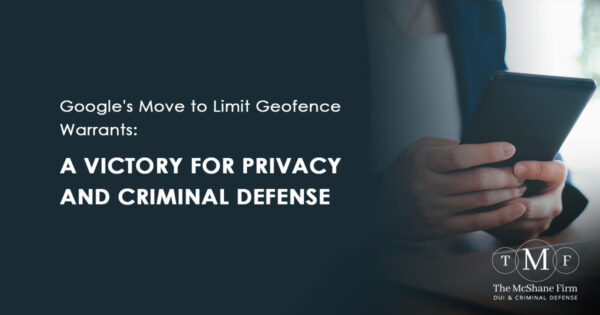Introduction:
In recent news, Google has taken a significant step to address a longstanding concern for privacy advocates and criminal defense attorneys alike—the use of geofence warrants. These warrants, also known as reverse-location searches, have raised serious questions about individual privacy and the implications for those caught in the wide net of surveillance. In this blog post, we will explore Google’s decision to restrict access to location data and how it represents a win for privacy rights and criminal defense.

Challenges with Geofence Warrants:
Geofence warrants have been a controversial tool used by law enforcement agencies to compel tech giants like Google to provide vast amounts of location data for all users within a specified area during a specific timeframe. While these warrants have been employed in various criminal investigations, their broad scope has led to legitimate concerns about their impact on individual privacy and civil liberties.
Google’s Shift Towards Privacy:
Google’s recent announcement signals a substantial change in its approach to handling geofence warrants. The company has made it impossible for law enforcement to access this location data, effectively ending its compliance with these warrants. This move is not only a victory for privacy advocates but also a significant development for criminal defense attorneys who have long challenged the use of geofence warrants in court.
Protecting Privacy Rights:
Jennifer Granick, an attorney with the American Civil Liberties Union (ACLU), applauds Google’s decision as a major step toward enhancing user privacy. The encryption and limitation of access to historical location data are important measures in safeguarding sensitive information that could otherwise be used against individuals.
Preventing Injustice:
One of the most concerning aspects of geofence warrants is their potential to implicate innocent people based solely on their presence near a crime scene. Innocent individuals can quickly become suspects, casting a shadow of doubt on their innocence. Jennifer Lynch, an attorney with the Electronic Frontier Foundation (EFF), has highlighted this injustice, which Google’s decision seeks to address.
Government’s Alternatives:
It’s essential to note that while Google’s decision restricts the use of geofence warrants, it does not prevent law enforcement from obtaining specific user data through other legal means. Investigators can still access individual user data when required, but the mass collection of location data without specific cause is now curtailed.
The Impact on Legal Challenges:
The ongoing legal challenges to the use of geofence warrants have garnered attention. Google’s decision to limit access to location data may influence the outcomes of these cases, potentially leading to a reevaluation of the constitutionality of such warrants.
Google’s Role in Shaping Legislation: Notably, Google’s stance on geofence warrants has significant implications for future legislation. While California once proposed legislation to prohibit companies like Google from complying with such orders, Google’s action has preemptively shifted the debate, potentially sparing future challenges.
Putting Geofence Warrants in Perspective:
While geofence warrants have aided in solving some significant cases, they have also raised profound questions about individual rights and privacy. Google’s decision underscores the importance of striking a balance between effective law enforcement and the protection of civil liberties. As advocates for criminal defense and individual rights, we welcome this shift and will continue to champion the cause of privacy and justice in the digital age.
Conclusion:
Google’s move to limit geofence warrants is a landmark moment in the ongoing struggle to protect individual privacy and the rights of those facing criminal charges. While these warrants may have been seen as a tool for law enforcement, they have posed significant risks to personal liberties. As a criminal defense firm committed to upholding our clients’ rights, we view Google’s decision as a significant win for privacy and justice, as it prompts essential conversations about the boundaries of surveillance and the preservation of individual freedoms in our increasingly interconnected world.


